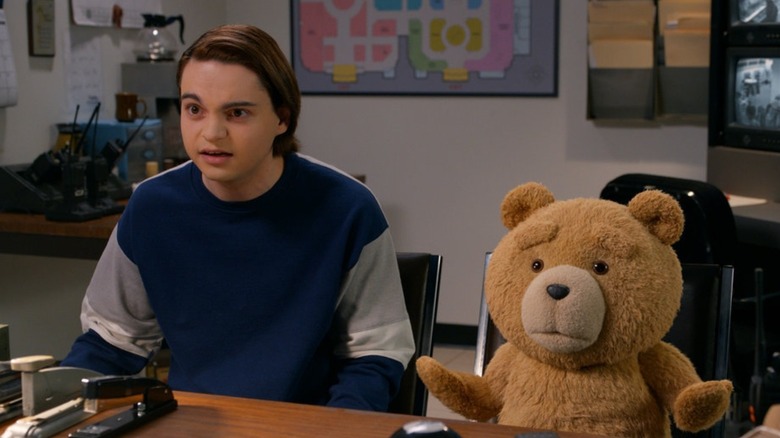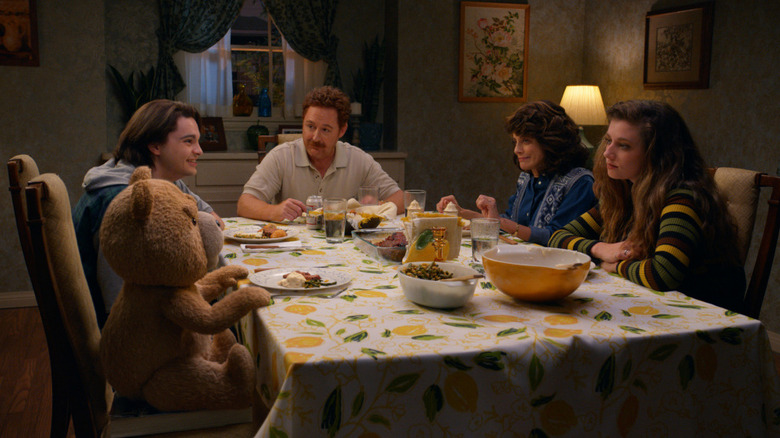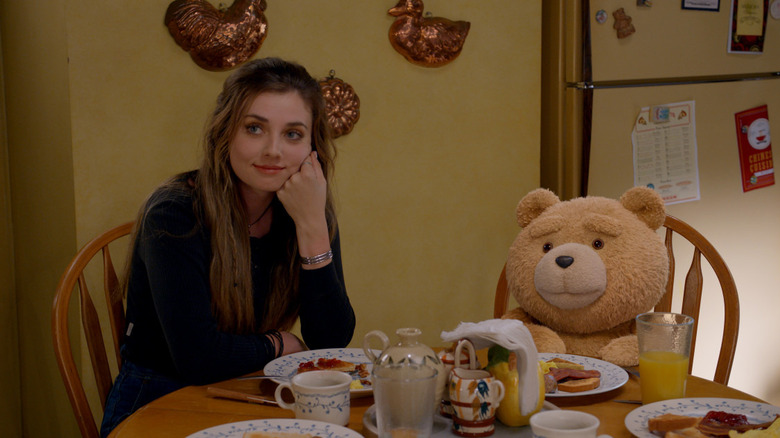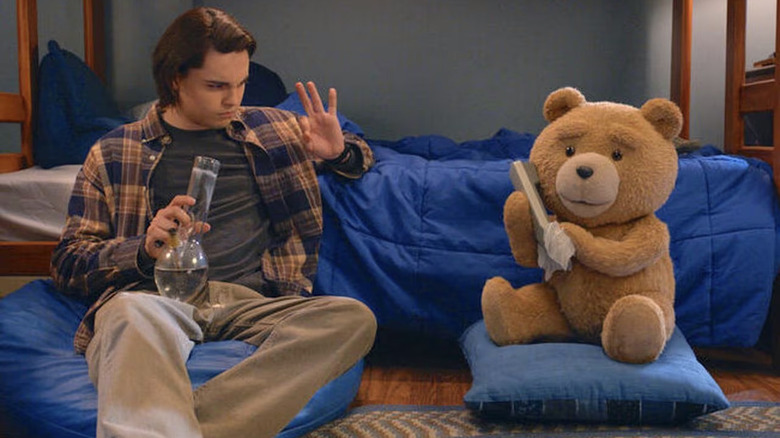Peacock's Ted TV Series Review: Seth MacFarlane Puts An Irreverent, Modern Spin On The '90s Sitcom
It's been over 10 years since "Family Guy" creator Seth MacFarlane made the jump to the big screen with his feature directorial and writing debut "Ted." In the 2012 comedy, Mark Wahlberg played John Bennett, a grown man stuck in a state of arrested development with his girlfriend Lori (Mila Kunis), because he can't stop smoking weed and screwing around with his best friend, a foul-mouthed teddy bear named Ted (voiced by Seth MacFarlane) that he magically wished to life when he was just a boy.
Of course, by the end of the movie, John realizes that he needs to grow up and become a bit more responsible and salvages his relationship with Lori. However, in 2015, "Ted 2" undid their happy ending, revealing that John and Lori got divorced six months prior to the start of the sequel, and the follow-up focused on Ted's battle in court for the right to have a kid with his wife Tami-Lynn (Jessica Barth), assisted by their attorney Samantha (Amanda Seyfried).
Now, Peacock has brought Seth MacFarlane back to the small screen, this time in the form of a prequel series also titled "Ted" that takes us back to John's formative years as a 16-year-old kid living in Framingham, Massachusetts. Framed as a single-camera '90s-esque sitcom with contemporary flair, "Ted" follows John as he deals with the trials and tribulations of navigating high school alongside his anthropomorphic teddy bear. But that's not all, because there's plenty of family drama to be found thanks to his loud-mouthed, right-wing father Matty (Scott Grimes), his amiable but amenable and naive mother Susan (Alanna Ubach), and his liberal, progressive, outspoken cousin Blaire (Giorgia Whigham).
A mostly restrained Seth MacFarlane
If you enjoyed the dynamic between John and Ted in both of the "Ted" movies from Universal Pictures, then you'll easily fall into a groove with Peacock's prequel series adaptation. At the same time, the series also offers a slightly different vibe that leans into the sitcom approach while putting an irreverent spin on some familiar formulas the genre has seen many times before. In fact, the "Ted" series feels like it relies a little less on the comedic tropes we've come to expect from Seth MacFarlane. Rather than providing a live-action version of his "Family Guy" formula with Ted and John at the center, instead, he provides a raunchy riff on "Roseanne" with a bit of "The Goldbergs" thrown in there, but without the overly pandering nostalgic references every five minutes.
Don't get me wrong, there are still plenty of strange yet hilarious asides and gags to be found through Peacock's "Ted," as well as some choice '90s throwbacks. But as the director and writer of the entire seven-episode run, it feels like MacFarlane showed a little more restraint in keeping the absurdity squarely focused on John and Ted, with some occasional wiggle room to give the rest of the family some of their own arcs too. Rather than relying on spontaneous, random cutaway gags or non sequitur humor, MacFarlane successfully utilizes the best of the buddy comedy formula between John and Ted, especially when it comes to their fast-talking banter and waxing about assorted trivial topics.
Of course, Seth MacFarlane is an old pro at this kind of thing, and if you're a fan of his comedy, he's providing exactly the kind of laughs you'd expect, touching upon inappropriate societal perspectives, peculiar pop culture references, and extensive observations about the oddities of everyday life. For example, in the Halloween episode, Ted and John have an ongoing discussion about the complicated meta existence of "The Monster Mash," the famous song that comes around every spooky season. Have you ever realized that the song is about monsters doing a dance called the Monster Mash, but even though the song that they do the Monster Mash dance to is also called "The Monster Mash," it's not the same song that we listen to alluding to the dance and song itself. This is the kind of silliness you can expect along with the usual stoner, masturbation, and d*** jokes.
Max Burkolder is fantastic
However, compliments must be given to another large reason why "Ted" works so well. Sure, MacFarlane is the star here, as the series is named after the bear he's voicing. But Ted doesn't work so well without his Thunder Buddy to bounce off. If there was one concern that I had with a "Ted" series was that the same comedic charm wouldn't be there without Mark Wahlberg. There's something especially hilarious about watching an actor like Wahlberg be a Boston bro with a soft spot for his raunchy teddy bear. The way the two interact in the movie always felt authentic, like these were two friends you knew in college. Surely, keeping that vibe alive with an entirely new actor in a different setting would be quite a challenge.
Max Burkholder is the twentysomething actor tasked with playing a young John Bennett, and while he doesn't exactly have the same presence as Wahlberg, he still manages to capture the same natural connection with MacFarlane as Ted, and he's just fantastic. The way the two effortlessly converse with each other, especially when they get caught up in one of their trademark moments of excitedly talking over each other, is executed perfectly. Burkholder even gets some of the more oddball moments, such as when Ted and John have to improvise certain scenarios to lie while pulling off teenage schemes, and John finds himself creating tragic backstories for non-existent characters that they're making up on the spot.
While Burkholder and MacFarlane are doing the heavy lifting here, the rest of the family gets their time to shine as well. Blaire is the next most prominent character, and she often gets caught up in whatever antics Ted and John are attempting to pull off, whether it's trying weed for the first time in the supersized series premiere that's nearly an hour long or trying to rent adult movies from the local video store. As Blaire, Giorgia Whigham gives the most grounded performance, often acting as the voice of reason for the entire family, but that doesn't mean she's a stick in the mud either, and she has her own moments of preposterousness too.
Alanna Ubach is also a riot as John's mother Susan. Though she's putting on a bit of an exaggerated voice that borders on feeling cartoonish, Ubach's performance always feels genuine, and she brings the right dose of earnest heart to the series. On the other end of the spectrum, Scott Grimes feels like he's starring in a much broader comedy as John's father Matty. With 90% of his dialogue being screamed as a perpetually bothered father, he's an annoying character with very few moments of subtlety or depth. Granted, that might be exactly how the character is supposed to be portrayed, because Boston fathers can be loud jerks, but Grimes is grating in a way that becomes less and less amusing as the series goes on. There are ever-so-brief moments of levity in Grimes' performance, but they're largely overshadowed by his usual volume and overstated presence.
One of the best TV adaptations of a movie
Back on the complimentary side, John and Ted's escapades are made even more entertaining by the surprising spins put on familiar sitcom tropes. For example, one episode finds the duo trying to get revenge on a school bully named Clive (played by "Never Have I Ever" supporting star Jack Seavor McDonald). After John and Ted learn that Clive's father abandoned him as a child, they pretend to be his father on the phone, making him think that he wants to reconnect. Predictably, they end up feeling bad about taking this prank too far when they leave him abandoned in a restaurant. But rather than ending the storyline with that lesson learned, John and Ted take it upon themselves to build Clive back up, and the two begin acting like adoptive fathers from afar, trying to help Clive achieve more in school and feel better about himself. Another episode uses John and Ted's attempts to rent an adult movie as a way of opening up a can of worms about the sex lives of John's parents, resulting in Alana Ubach giving one of the funniest performances with a banana that I've ever seen.
Of course, the strange twists and turns don't always work. In the Christmas episode, which is the penultimate episode of the season, amidst a major family argument, John's father ends up wishing another inanimate toy to life, and it starts to feel just a little too absurd. The episode still ends up working for the most part, largely thanks to the heartfelt subject matter that comes from Blaire's side of the story, but that's where "Ted" almost goes off the rails. If there's one overarching problem the series has, it's that the episodes, ranging anywhere between 35-40 minutes, could probably be trimmed down a bit to a tighter edit. But the rapid-fire comedic pacing still has very few lulls.
Overall, "Ted" is a hilarious expansion of Seth MacFarlane's ribald comedy franchise. In fact, even though the bar has never been set consistently high in this department, "Ted" just might be one of the best TV adaptations of a movie that's ever been done. From the surprisingly slick visual effects bringing Ted to life on a smaller budget to the seamless transition between Mark Wahlberg and Max Burkholder, Peacock's "Ted" series works infinitely better than you might have anticipated. Personally, I'm hoping there's more foolishness to come, but if not, this seven-episode run works perfectly well as a standalone series.
/Film Rating: 8 out of 10
All episodes of "Ted" are streaming now on Peacock.



